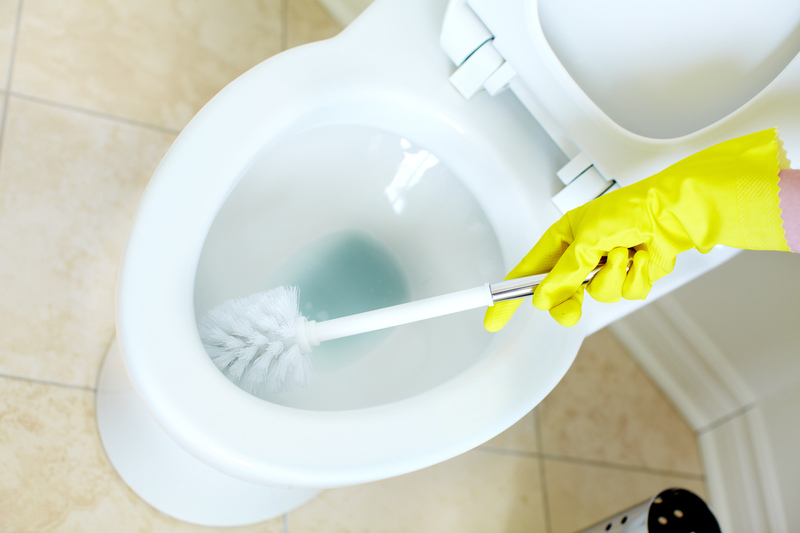Create a Welcoming Environment by Removing Pet Odor
Posted on 11/06/2025
Create a Welcoming Environment by Removing Pet Odor
A truly warm and inviting home doesn't just look beautiful--it also smells pleasant and fresh. For pet owners, achieving this can be a unique challenge. While our furry friends bring us joy and companionship, they can also introduce stubborn odors that linger in carpets, furniture, and the air. If you want to create a welcoming environment for guests and family alike, removing pet odor is essential. In this comprehensive article, we'll discuss expert-backed, practical strategies to eliminate pet odors and keep your home smelling its best.

Understanding the Source: Why Do Pet Odors Linger?
Before diving into removal methods, it's important to understand why pet smells are so persistent. Dogs, cats, and other pets have unique oils and bacteria on their fur and skin. Accidents, litter boxes, and pet beds can all harbor odors. Pet dander also accumulates in corners and fabrics, while urine contains ammonia and other compounds that linger if not properly cleaned.
- Oily Skin/Fur: Natural oils transfer from your pet onto surfaces, which can trap odors.
- Urine Accidents: If not quickly removed, urine seeps into carpets and padding, causing odors that are tough to eradicate.
- Pet Bedding and Toys: Soft materials absorb scents over time, contributing to a general pet smell.
- Litter Boxes: Even the cleanest cat owners can find odors accumulating if boxes aren't cleaned often enough.
- Saliva and Sweat: Pets groom themselves by licking, spreading saliva which dries and leaves odor-causing substances behind.
No matter the source, pet odors can become a permanent fixture unless you address them directly and consistently.
Why Removing Pet Odor Matters
Living with pet smells can have more profound consequences than you might realize. Persistent odors can cause embarrassment when entertaining guests, reduce your property's value, and even trigger allergies and respiratory issues, especially in sensitive individuals.
- Health Benefits: Removing pet odor reduces exposure to allergens, bacteria, and other irritants that could affect your family's health.
- First Impressions: Pleasant-smelling homes feel cleaner and more inviting, reassuring guests that your household is well cared for.
- Resale Value: Lingering pet stains and smells can significantly hinder your home's market appeal.
If you want to create a welcoming environment by removing pet odor, the following strategies provide a solid foundation.
Proven Strategies for Removing Pet Odor
1. Regular Cleaning Routines
Consistency is key. The best way to prevent and minimize pet odors is to commit to a frequent cleaning schedule:
- Vacuuming: Use a vacuum with a HEPA filter on carpets, rugs, and upholstery at least twice a week. Don't forget to clean under furniture and in corners where pet hair and dander collect.
- Laundering: Wash pet beds, blankets, and slipcovers weekly with odor-fighting detergent. Add a cup of white vinegar for extra deodorizing power.
- Litter Box Maintenance: Scoop litter boxes daily and replace the litter entirely weekly. Wash the box with soap and water to remove residue.
- Hard Surfaces: Mop floors and wipe down baseboards regularly, as dirt and oils from paws can settle on these surfaces.
2. Address Accidents Immediately
Even the most well-trained pets can have accidents. Fast action can prevent long-lasting odors:
- Blot, Don't Rub: If the mess is fresh, blot up as much as possible with paper towels or a clean cloth.
- Use an Enzymatic Cleaner: These cleaners break down the proteins in urine and feces, eliminating odors at the molecular level. Let the product soak for the recommended time to reach all affected areas.
- Treat Underlying Padding: For carpets, apply the cleaner beyond the visible stain to reach urine that may have seeped beneath the surface.
*Pro Tip:* For dried stains, rehydrate with warm water before applying cleaner to maximize effectiveness.
3. Professional Deep Cleaning
Sometimes routine cleaning isn't enough. Annual or bi-annual deep cleaning--either DIY or by a professional service--can make a world of difference. Services include:
- Carpet and Upholstery Cleaning: Professional equipment extracts pet hair, dander, and embedded odors from deep within fibers.
- Air Duct Cleaning: Removing pet dander and hair from your HVAC system can improve both air quality and odor control.
- Hard Surface Treatment: Specialized cleaners can be used for tile grout, hardwood, or laminate to remove lingering odors.
4. Freshening the Air Naturally
To eliminate airborne pet odors, look beyond temporary solutions like sprays and focus on methods that actually remove, rather than mask, unpleasant smells:
- Ventilation: Open windows whenever possible to allow fresh air to circulate and odors to dissipate.
- Activated Charcoal: Place small bowls or bags of activated charcoal around your home to absorb odors naturally.
- Baking Soda: Sprinkle on carpets, let sit overnight, then vacuum up to neutralize smells.
- Air Purifiers: Choose a unit with a HEPA and activated carbon filter to capture airborne pet particles and odors.
- Houseplants: Some plants, like peace lily and snake plant, naturally purify indoor air and reduce odor-causing chemicals.
5. Groom Your Pets Regularly
A crucial step in preventing pet odors is maintaining your pet's hygiene. Develop a grooming routine that suits your animal's needs:
- Bathing: Wash your dog monthly or as recommended by your vet. Cats generally self-groom but may require occasional baths if they get into messes.
- Brushing: Daily brushing removes loose fur and dander, reducing how much ends up on furniture and in the air.
- Wipe Paws: Especially after walks, wiping paws keeps mud, dirt, and outside odors from entering your home.
- Dental Care: Dental hygiene can prevent bad breath from becoming pervasive throughout your house. Brush teeth or offer dental treats regularly.
Specialized Solutions for Stubborn Pet Odors
Carpet and Upholstery Treatments
Carpets and upholstery are notorious for trapping pet smells, but these techniques can help:
- Steam Cleaning: Uses hot vapor to kill bacteria and break down odor-causing molecules.
- Vinegar Solution: Mix equal parts white vinegar and water, spray on surfaces, and blot with a clean cloth after 10-15 minutes.
- Baking Soda Paste: Mix baking soda with a few drops of water, apply to the area, let dry, and vacuum up for a powerful deodorizing effect.
Deodorizing Walls and Hard Surfaces
Pet odors can stick to walls, especially in households with cats. Try these approaches:
- Wipe Down Walls: Use a warm water and mild dish soap solution, then dry thoroughly.
- Magic Erasers: Remove marks and odors with gentle scrubbing.
Litter Box Management for Cat Owners
- Air Purifying Litter: Choose litter that controls odor and has natural deodorizing properties.
- Covered Litter Boxes: While popular, these can trap smells inside. Make sure to clean them even more frequently.
- Ventilated Location: Place the box in a well-ventilated area away from main living spaces.
Choosing the Right Cleaning Products
Some cleaning products contain harsh chemicals that are unsafe for pets and may only mask odors rather than remove them. When selecting products:
- Opt for Enzyme-Based Cleaners: These are specifically formulated to break down organic material in urine, saliva, and vomit, leaving surfaces truly clean.
- Avoid Ammonia-Based Cleaners: Ammonia smells similar to urine and can tempt pets to revisit the spot.
- Read Labels: Look for products marked as pet safe and biodegradable.
- DIY Solutions: Vinegar, baking soda, hydrogen peroxide, and essential oils (make sure they are pet-safe) offer natural cleaning options.
Preventing Pet Odors from Returning
Once you've succeeded in removing pet odor, prevent it from returning with these habits:
- Frequent Grooming: Keeping your pet clean prevents excessive buildup of dander and oils.
- Promptly Clean Accidents: The faster you act, the less likely odors will set in.
- Encourage Outdoor Time: Weather permitting, give your pets plenty of fresh air and play outside to reduce indoor messes.
- Routine Checkups: Address health issues like gum disease, ear infections, or skin problems that cause persistent smells.
DIY Pet Odor Remover Recipes
Try these effective, natural home remedies to remove pet odors and freshen your space:
- Baking Soda Carpet Refresher: Combine 1 cup baking soda with 10 drops of lavender essential oil (ensure pet-safe), sprinkle over carpet, let sit overnight, and vacuum up in the morning.
- White Vinegar Solution: Mix equal parts white vinegar and water in a spray bottle. Mist on surfaces, then blot dry to neutralize odors without leaving a residue.
- Lemon Deodorizer: Boil lemon peels in water for a fresh, clean scent throughout your home. Let the steam circulate by opening a few doors.

When to Call in the Experts
If the above methods don't resolve your issues, there are times where professional intervention is best:
- Extensive or Old Stains: Persistent old urine stains may require extraction by a professional.
- Multiple Pets: Homes with several animals may benefit from quarterly professional cleaning.
- Rental Properties: If you rent out your home, a pet-odor removal service can help return your property to a neutral scent for new tenants.
Final Thoughts: Creating a Truly Welcoming Environment
A welcoming and odor-free home is possible for every pet owner. It requires a mix of regular cleaning, immediate accident management, effective use of enzymatic and natural cleaning agents, and ongoing pet hygiene. With these steps, not only will you remove pet odor from your home, but you'll also create an inviting, pleasant space for family, friends, and guests.
Remember: A fresh-smelling home doesn't mean your pets have to go--just that your cleaning routine needs to work a little harder!
Quick Checklist to Remove Pet Odor and Keep Your Home Welcoming:
- Vacuum and clean all surfaces regularly
- Groom your pets and keep bedding clean
- Use enzymatic or natural cleaners for accidents
- Refresh the air and improve ventilation
- Eliminate the source--not just the smell
By following these tips, you'll effortlessly create an inviting environment by removing pet odor and enjoy the best of both worlds--a happy pet and a beautifully fragrant home!
Latest Posts
Craft Perfect Streak-Free Windows Every Time
Discover the Best Ways to Clean uPVC Window Frames
Unlock Carpet Cleaning Success with Top Tools
Revamp Your Living Area: Strategies to Get Rid of Damp Smell
Embrace a tidier spring with our top-notch Deep Clean guidelines



